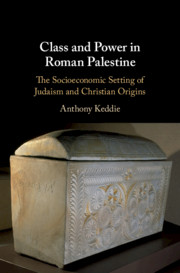Refine search
Actions for selected content:
3 results
Chapter 6 - Music at the Social Recreations of the Lower Classes
-
- Book:
- Music at Social Meals in Greek and Roman Antiquity
- Published online:
- 18 November 2022
- Print publication:
- 01 December 2022, pp 223-264
-
- Chapter
- Export citation

Class and Power in Roman Palestine
- The Socioeconomic Setting of Judaism and Christian Origins
-
- Published online:
- 03 October 2019
- Print publication:
- 03 October 2019
Introduction
-
- Book:
- Class and Power in Roman Palestine
- Published online:
- 03 October 2019
- Print publication:
- 03 October 2019, pp 1-15
-
- Chapter
- Export citation
